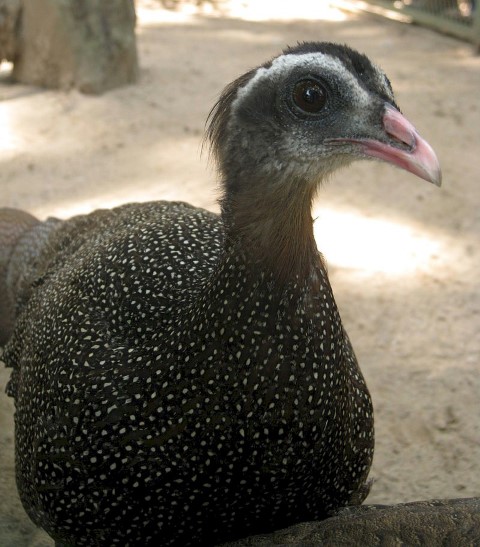 |
| Photo Source: Wikipedia.org |
The Crested Argus is a species of pheasant known for its distinctive appearance. It has dark-brown spotted black and buff feathers, a large pink bill, brown irises, and blue skin around its eyes. The head has two crests, one of which extends down the back of the head and can be raised when the bird is alarmed or during certain behaviors like pair bonding or courtship displays.
The male Crested Argus has a wide and elongated tail with twelve feathers, the longest of any bird. The tail coverts, or train, can reach up to 1.73 meters in length and are believed to contain the longest and widest feathers in any wild bird. The female is similar in size, but with a more colorful dorsal plumage and a different type of crest. Her tail is also elongated but shorter than the male's. The average length of the female is around 74-75 cm and she weighs approximately 20% less than the male, who averages around 1.5 kg in weight.
The wings of the Crested Argus are unique, being wide and square like those of Argusianus, rather than rounded and short like typical pheasants. They have no discernible trailing edge in the flight feathers, which suggests that the species has the capacity for sustained flight. The feet and legs of the Crested Argus are also notable, with males having developed leg scales that give their limbs the appearance of a lizard's forelegs. The toes are long and slender, and like other peafowls, the hind toe is less recumbent than those of more terrestrial Galliformes.
Very little is known about the behavior and ecology of the Crested Argus, as they are shy and elusive birds found in primary submontane forests in Southeast Asia. Their diet consists mainly of invertebrates, mollusks, amphibians, small reptiles, bamboo shoots, leaves, fruits, and fungi.
While some authorities believe they are polygamous, there is no direct evidence to support this theory. The male Crested Argus performs various displays that can include serpentine movements, quill vibration, and stomping of the feet. These displays may be used in anti-predatory encounters, especially with reptiles. The species is known for having marked delayed maturity, with individuals appearing fully mature only in their fifth or sixth year.
